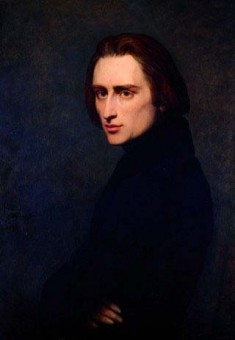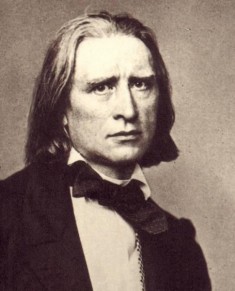| Franz Liszt | |
|---|---|
 |
|
| Composer | |
| Specialty | Virtuoso pianist, conductor, Franciscan tertiary |
| Born | Oct. 22, 1811 |
| Died | Jul. 31, 1886 |
| Nationality | Humgarian |
Franz Liszt was a Hungarian composer. He was also one of the foremost pianists of his generation as well as being an accomplished teacher and conductor. He helped a large number of other composers, including Berlioz and Wagner.
Liszt was an important representative of the New German School, inventing the symphonic poem and introducing new developments in harmony. His work in transcribing existing music for piano also helped otherwise little-known music to become popular.
Early Life
Liszt was born in the Hungarian town of Raiding on October 22, 1811. He was taught to play the piano by his musical father, to the extent that he was giving concerts by the age of nine and starting to compose his own pieces. His father, having obtained permission from his employer, Prince Nicholas Esterhazy, accompanied the young Franz to Vienna.
The prodigy was supported by Antonio Salieri, who gave him free tuition in composition. The boy gave a succession of performances before prominent people in Vienna and became known for his ability to take a melody provided by a member of the audience and work it into a new composition.
When he was 12 years old, Liszt was denied entry to the Paris Conservatory School on the grounds of nationality. Instead, his father arranged further private tuition, this time from Ferdinando Paer. It was at this point that the boy composed Don Sanche, his only opera.
When his father died in 1826, Liszt – still only 15 – was hit very hard. He lived with his mother in a small apartment in Paris, but found it difficult to such an extent that he lost much of his interest in music, instead throwing himself into studying religion and art. These subjects would later prove significant in his musical compositions.
Liszt’s Adult Years
In 1833, Liszt met and fell in love with the Comtesse Marie d”Agoult, and this helped to rekindle his interest in music. He wrote several pieces based on the countryside of Switzerland which eventually became the Années de Pèlerinage. The following year, he produced a set of piano compositions, plus three works he dubbed Apparitions.
 The combination of these new works and his impressive public concert performances gave a major boost to his reputation, and he became increasingly famous throughout Europe. Liszt was particularly well thought of because he was known to support a range of humanitarian and charitable causes, donating much of his concert income to them.
The combination of these new works and his impressive public concert performances gave a major boost to his reputation, and he became increasingly famous throughout Europe. Liszt was particularly well thought of because he was known to support a range of humanitarian and charitable causes, donating much of his concert income to them.
In 1842, a serious fire devastated large areas of Hamburg. Liszt responded by holding several concerts in order to raise funds with which to help the city”s newly homeless people. Despite this public renown, however, his personal life had become unhappy. He had three children with Marie d”Agoult, but the relationship eventually broke down.
While he was in Kiev in 1847, Liszt met Princess Carolyne zu Sayn-Wittgenstein, who urged him to call a halt to his tireless schedule of tours, and instead dedicate himself to composing and teaching. He agreed and gave his last paid concert that September, then going on to the princess”s Woronince estate for the winter.
Later Years
In 1848, the couple moved to the German city of Weima, where Liszt decided to work on a completely new musical form, the symphonic poem. This was an orchestral equivalent of an opera in that it brought together drama and music in the cause of representing a source from outside music, whether it was a painting, a story, or a poem.
The new style was an immediate sensation, and pupils flocked to Weimar to ask for Liszt”s help in composing their own. Not everyone was so supportive, however, and there were almost as many detractors as fans. But Liszt”s pieces quickly became popular enough that they were performed in concert halls all over Europe.
Liszt”s son died in 1859 and his daughter three years later. He was also struggling professionally at this time: Brahms was the co-author of a manifesto attacking his work and that of the modernists who followed him. In 1860, Liszt went to Rome with the intention of marrying Carolyne, but her divorce papers were incomplete.
Liszt was deeply upset and decided on a lonelier life for himself in a small monastic apartment near the city. Despite becoming a monk, he continued to compose: his music was played for the Hungarian coronation service in 1867. He also returned to giving regular piano lessons throughout the 1870s. His health declined markedly after a fall down a flight of stairs in 1881, and he died in Bayreuth on July 31, 1886.